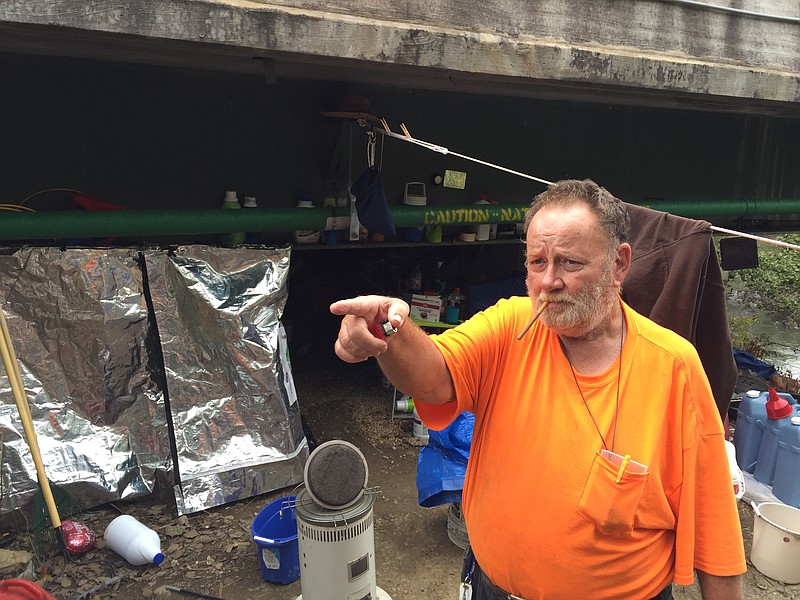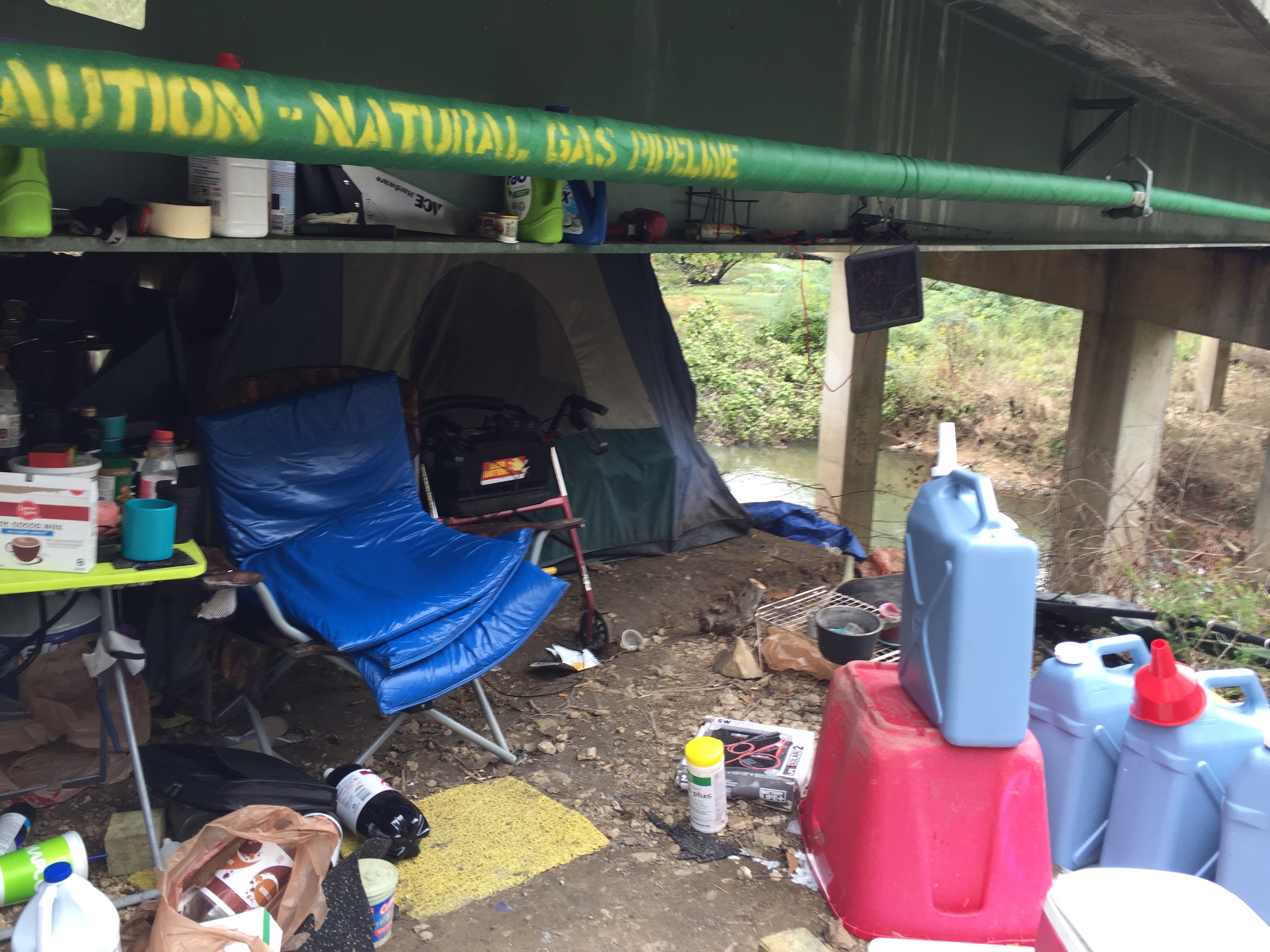RINGGOLD, Ga. - As city officials weigh whether to force them out, the homeless under a bridge say they have nowhere else to go.
Councilman Larry Black asked his fellow elected officials Monday night to consider an "urban camping" ordinance, which would make it illegal to live under U.S. Route 41 in Ringgold, next to South Chickamauga Creek. Black said residents complain that the population - currently four people - bothers neighbors and charges its cellphones outside the Ingles down the road.
Under an ordinance, Ringgold police officers could warn the homeless they are in violation of city code. Black wants officers to also give them a list of shelters where they could move. If that doesn't work, officers could issue fines.
"We want to do the humane thing," Black said. "We want to tell them, 'Here are some alternatives.' We hope they will comply. Everybody has different situations."
But multiple people living under the bridge, as well as defense attorneys and advocates for transitional housing, say a city ordinance won't solve any problems. Usually, people who move here are registered sex offenders, fresh out of prison. They can't live within 1,000 feet of a church or school. Family won't take them in. They've lost old friends.
A community supervision officer tells them to come here, where the bridge shields them from rain during storms and the sun on hot days. Plus, the officers always know where to find them.
James Louis Waters Jr., 66, moved under the bridge on July 11, two days after his release from Johnson State Prison. He has a tent, a stove and pots and pans. On a shelf, he keeps tools and detergent. He cleared some nearby brush to give him a better view of the creek.
Waters served two decades on convictions of child molestation and aggravated sodomy. When he was released from prison, he said Georgia Department of Community Supervision Officer Keith Green tried to find him a place to live in LaFayette. When he couldn't find openings, Waters said, Green sent him here.
He lives off a $1,000-a-month Social Security check, which is delivered to Green's office. He spends most of the money on food or other supplies for the makeshift camp. He doesn't think he can save up enough money for a deposit at an apartment, assuming the location isn't too close to a church or school. Also: assuming the staff doesn't require a background check.
"You spend 20 years in prison," he said, "the only thing you see is four walls. This is heaven to us."
Two men visited Waters on Tuesday morning. Scott Hullender, who works across the bridge at Babb Lumber Company, dropped off a heater. He said Waters and the other men under the bridge haven't caused problems for the business. Some of them have bought wood for their campsite.
Nate Sanders stopped by the bridge after reading about the issue on Mayor Nick Millwood's Facebook page. He said he didn't know that people lived there before Tuesday. He asked Waters how he could assist him.
"Jesus didn't instruct us to sit around and ignore people who could potentially need help," Sanders said.
Undecided council
Councilmen Kelly Bomar, Terry Crawford and Randall Franks told the Times Free Press on Tuesday that they weren't yet sure where they stood on the issue. They hope to discuss it more in future meetings before making a decision.
Millwood, meanwhile, said he was against the idea on first blush. He said he has heard from several residents about resources that could assist the homeless population. But the council is far from forming a firm plan to address the roots of the issue - or even come up with a useful way to help. Millwood, who would only vote if the council was deadlocked on an ordinance, has not spoken with the Department of Community Supervision yet.
"If we do anything," he said, "we should go out of our way to find them good options before we pass an ordinance about it. I'm not supporting the ordinance right now. I need to figure out if we can help them long term."
John Banker, who lives on Old County Road down the street from Waters' tent, said he supports an ordinance. He doesn't have a problem with Waters personally. But people park their cars next to the campsite to visit the probationers. The cars are on Banker's property, and they ruin the grass.
Plus, there are a couple of problems here and there. One night this summer, he said a man and woman who lived under the bridge got into a shouting match. Banker woke up, worried that the man was going to harm the woman. (Water said both have since moved out.) Another time, Banker said, someone left dozens of soiled diapers stacked under the bridge. Someone left one on the stop sign.
"It stunk like awful," Banker said.
In a parking lot next to the bridge Tuesday morning, Adam Dax Woody felt stuck. When he was released from a probation detention center in Valdosta on Thursday, he said the Department of Community Supervision paid for his bus ticket back to Catoosa County, where he is from. But he lost his old apartment, and his grandmother died while he was away.
Woody can't live with his family in Tennessee while on probation, unless officials on both sides of the line process an interstate compact. He was told that could take months.
He said he was arrested because he borrowed his friend's car, which - it turns out - was actually stolen. (According to Catoosa County court records, he was also arrested for statutory rape in 2004, when he was about 20 years old.)
He said Green, who is also his community supervision officer, told him to come to the bridge. He has a 7 p.m. curfew and must be here in case Green checks on him. Given his predicament, he doesn't see the use of a fine from the city.
"I guess you better cite me," he said. "It's either that, or I go to prison. You're giving me no option. What are you going to fine me? I have no money. You're going to lock me up? I'm going to get locked up if I don't live under this bridge."
Nowhere to go
Lookout Mountain Judicial Circuit Public Defender David Dunn has represented multiple clients who ended up under the bridge after their sentences. Some have owned homes in Tennessee and Alabama, but they are stuck here on probation. He said there are no transitional houses available in the circuit, which includes Catoosa, Chattooga, Dade and Walker counties.
"I don't think anyone is living under the bridge because they want to be there," he said. "They are living there because they have absolutely no place to go."
David Boyle, who organizes the LaFayette Area Correctional Task Force, said his group has tried to open transitional housing in the area for four years. The chief problem is location. They have to find a place where sex offenders can legally live. At the same time, they need a place that is close to downtown. Some of the offenders don't have cars and can't walk several miles for groceries or other basic needs.
The task force meets the second Thursday of every month at LaFayette Presbyterian Church.
"We're working," he said, "and thinking."
In the meantime, Boyle believes the bridge in Ringgold is the best of all the bad options.
Contact staff writer Tyler Jett at 423-757-6476 or tjett@timesfreepress.com. Follow him on Twitter @LetsJett.

